[ZX Spectrum, MAP Software]
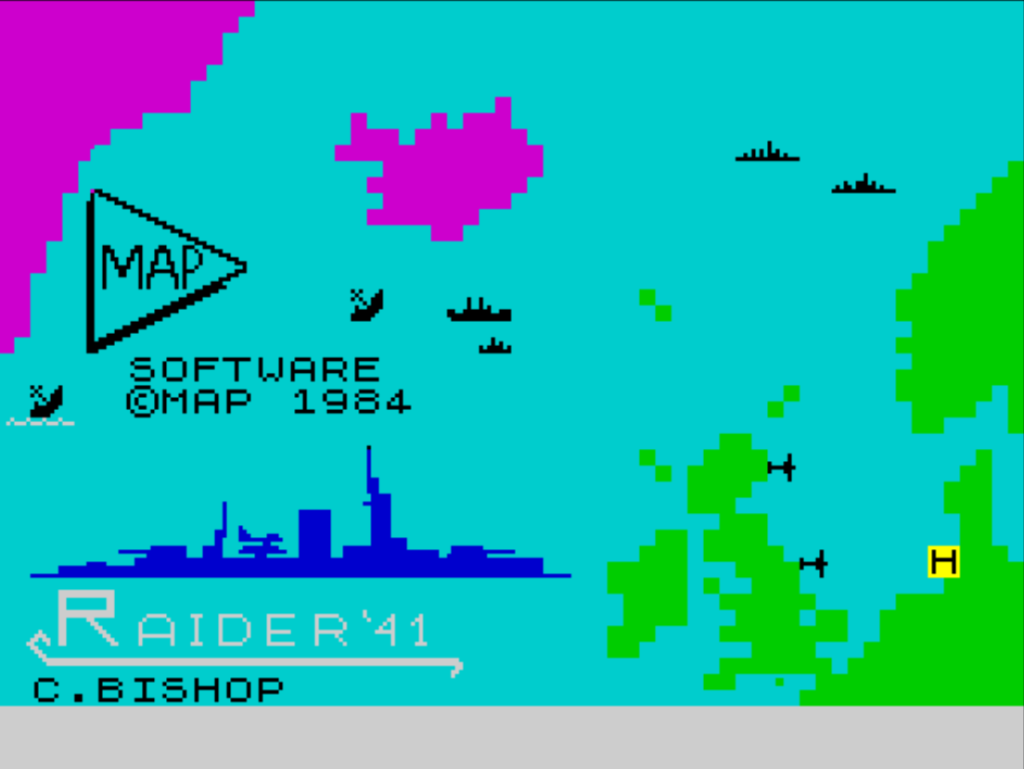
I had to postpone my article on Panzer War for a reason that should soon be both clear and pleasing. But I figured that, to bridge the gap, I could always check my list of ZX Spectrum games and pull one of those games that never received neither ads nor reviews but still somehow ended up on Spectrum Computing.
Raider ’41 covers the famous German pocket battleship that terrorized the British in the Atlantic. No, not that one, the other one – the Graf Spee. Both the splash screen and the title are misleading given the Graf Spee was active in the South Atlantic and was eventually scuttled in 1939.
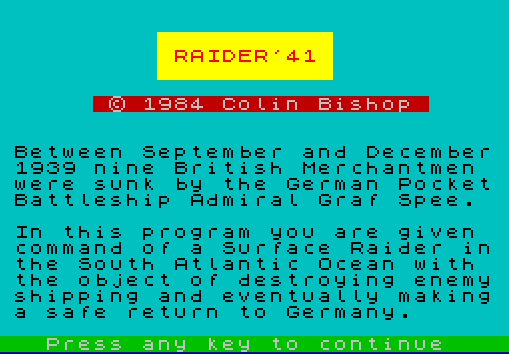
The game starts with the player in a random location in the South Atlantic:

Occasionally, a “contact report” appears on the map…
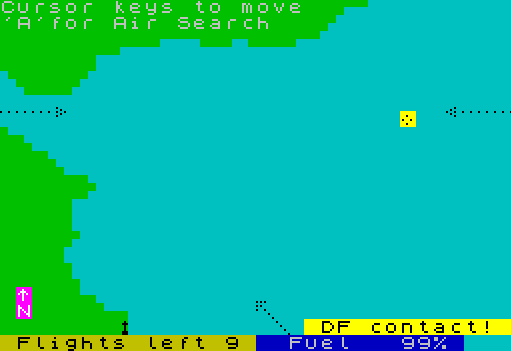
… and most of the time, this is not going to help you at all, because the “contacts” beeline for the exit points (the “start” of the arrows) and they go exactly as fast as you: 1 square/turn.
You can also send seaplanes North, South, West or East (no diagonal!). It will tell you by how much you are missing your target:
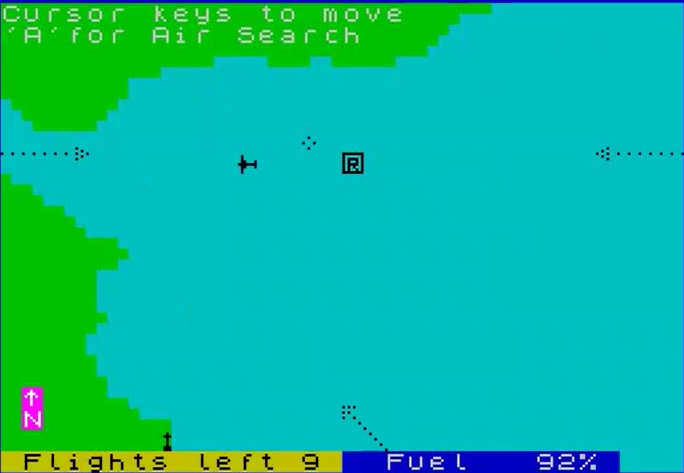
Once all potential targets have exited the area, the game resets your position and starts again:
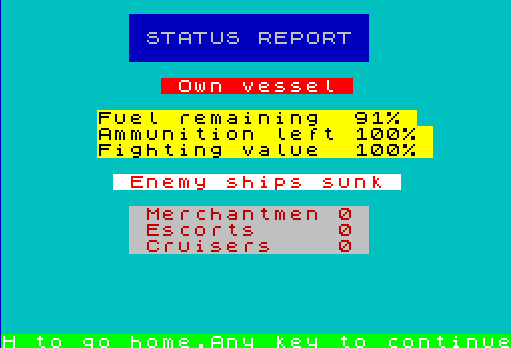
But sometimes, sometimes, you are lucky and the Graf Spee spawns near the main West-East axis used by the merchant ships, in which case you just have to wait on the closest exit square and hope that it is the one chosen by the allied convoys…
Ah! Caught one…
… Uh! No! That’s the Altmark, Graf Spee‘s supply ship!
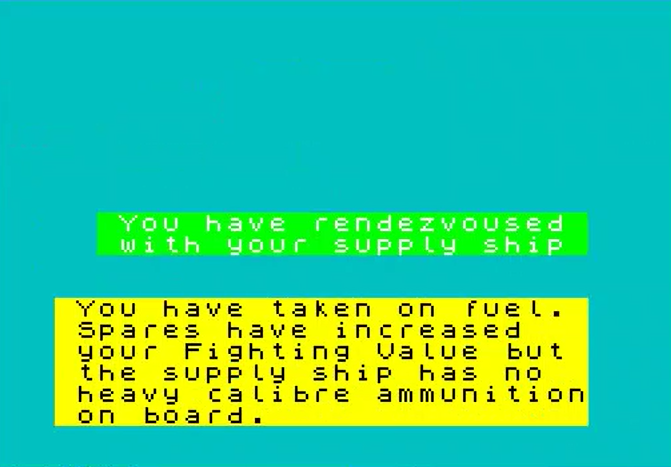
The Altmark transfers some fuel to my ship, so I can have more of this exciting gameplay.
Eventually, however, I catch a “real” convoy, which moves the game to the tactical phase:
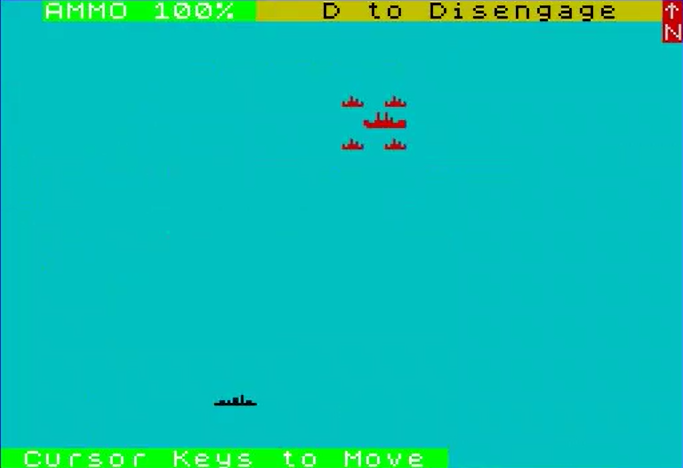
In this case, the convoy is composed of one escort and four cargo ships. The cargo ships scatter in all directions – including mine, which is not smart if you ask me – while the escort approaches my ship to engage.
The Graf Spee can attack in any of the 8 directions once every turn. You need to specify the exact range (from 1 to 6) and it is easy to overshoot the target. Meanwhile, the escort ship shoots back, mostly missing but sometimes hitting me, dealing 100-200 damage. For the record, I have 18 000 health points (called “Fighting Value”) and the Altmark will be able to repair me.
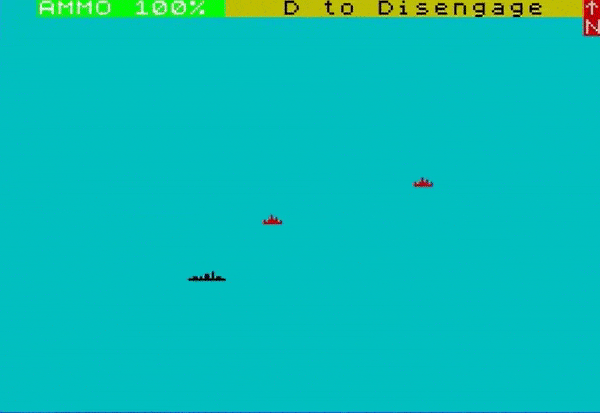
The escort ship goes down after 3 direct hits, and the hunt continues.
A bit later, I encounter another convoy – without escort this time, and sink two more ships.
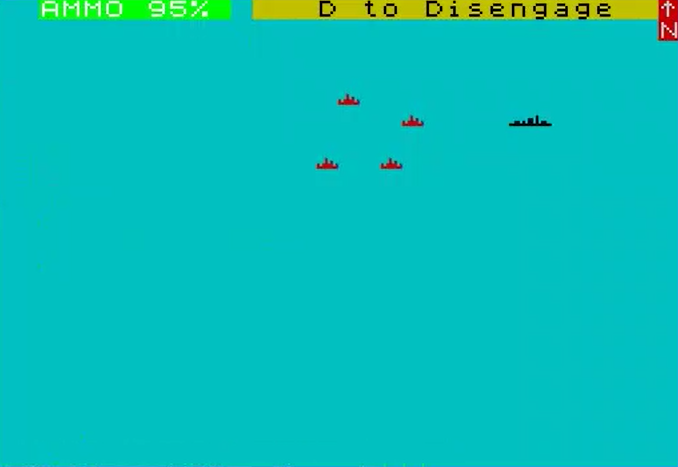
After a last convoy attack (one escort and one cargo sunk), the crew of the Graf Spee is on the verge of mutiny: this is a dreadful way to wage war, everyone is bored to death – better to die assaulting the Maginot Line than another month of THIS! I still have plenty of ammo and fuel, but I head home.
After a non-interactive animation showing the Graf Spee heading North…
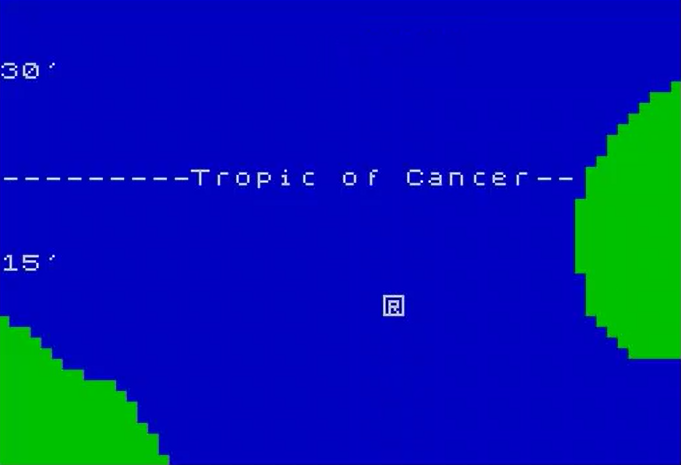
I reach the final phase of the game and must break through the British blockade:
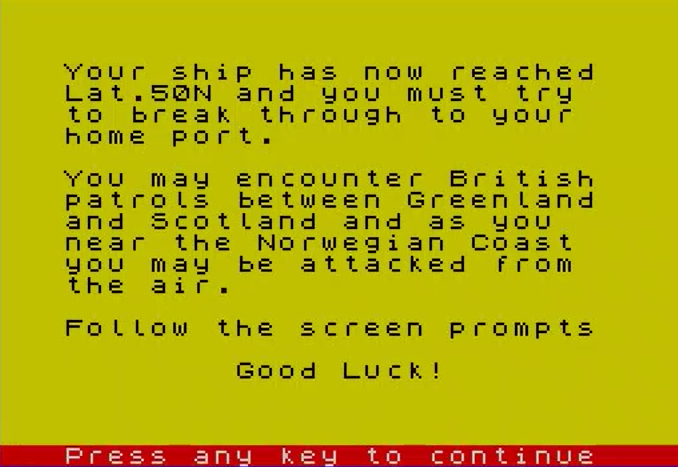
The game shows a map of the Northern Atlantic, but I don’t see any reason not to hug the coast:
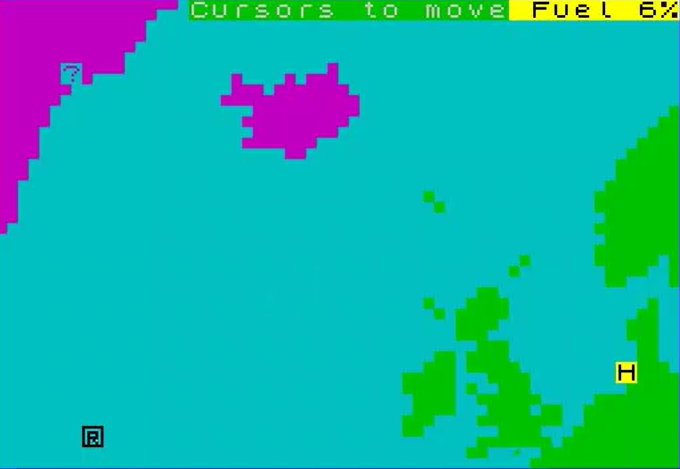
In the middle of the Atlantic, I am attacked by a British battleship, a species endemic to the North Atlantic that never travels South. Each “hit” by the battleship does 1000 to 2000 damage – for reference even cruisers (not encountered in this session) never deal more than 300 damage. Conveniently enough, there are patches of fog left and right, and I can move in one to escape. It is, in my opinion, the only good idea in this game.
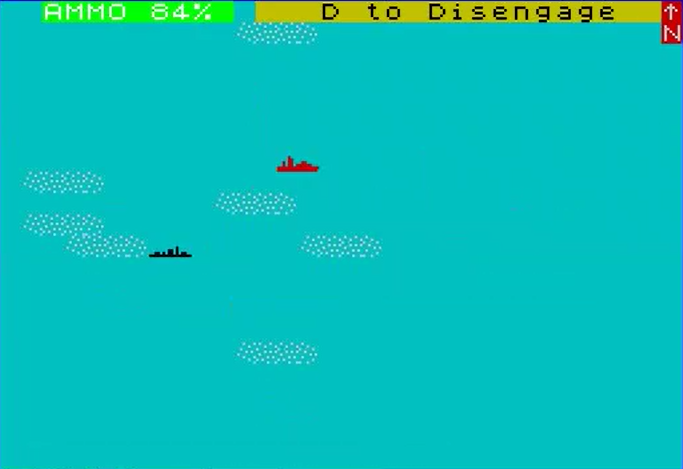
Later I cruise in front of Scapa Flow. No one seems to care.
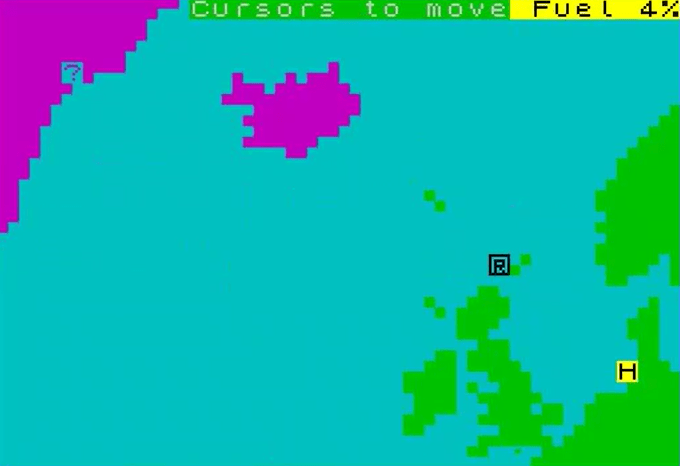
As I approach my home port, I am attacked by planes (and hit) four times, for 2400 damage in total.
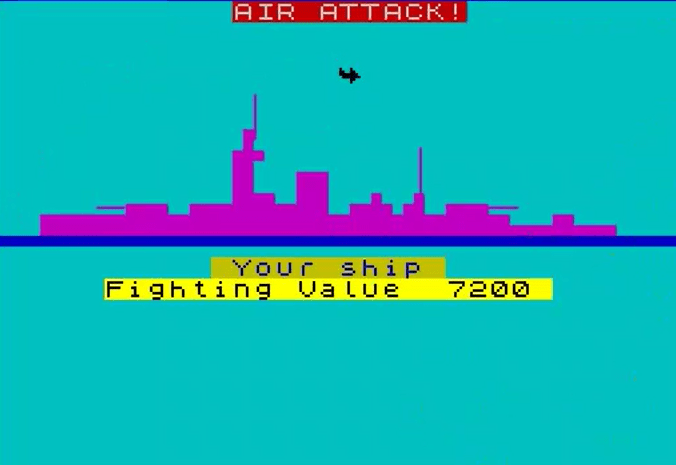
Finally, I reach my port. With tears of joy, I learn that I am going to be reassigned to a minesweeper. I’ve played that game, and I can guarantee that it is going to be significantly more fun than what I just did.
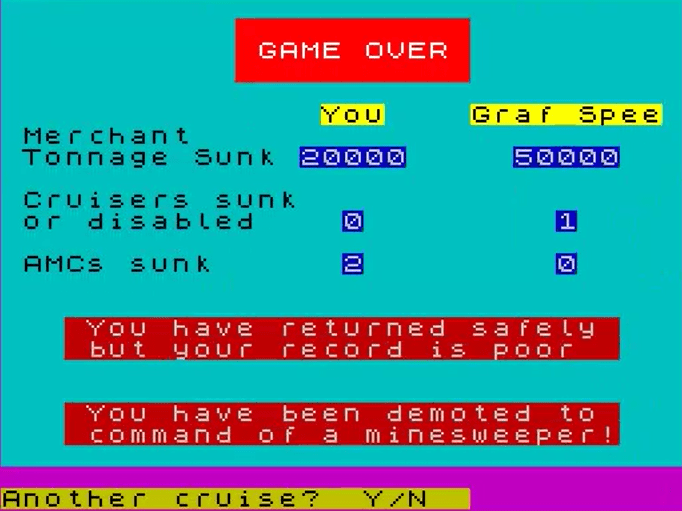
Ratings & Review
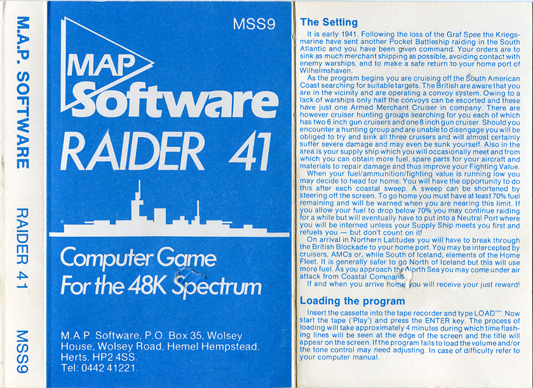
Raider 41, by Colin Bishop, published by MAP Software, UK
Genre: Naval Operations
First release: Probably 1984
Average duration of a campaign: Until boredom makes you end it.
Total time played: 45 minutes
Complexity: Trivial (1/5)
Final Rating: Totally obsolete (born obsolete, if that category existed)
Ranking at the time of review: 115/115
It is extremely hard to find anything about MAP Software. For once, Spectrum Computing has nothing: no ads, no company information, nothing except that MAP Software only released one other game (Operation Cerberus in 1985, also by Colin Bishop and covering the Channel Dash) and five programs related to flight (Aerofoil Section Plotting, Aircraft Performance Prediction, Electric Flight, Glider Design Aid and Multifoil), none of them by Colin Bishop. Researching “MAP Software” on archive.org yields nothing, researching “Colin Bishop” yields nothing either, but researching the address indicated on the manual reveals that MAP Software shares it with… Argus Specialist Exhibitions.
I have already covered Argus Press, and more specifically its software branch Argus Specialist Publication Software (ASP Software), which released amongst others one decent “Bismar(c)k” game. Argus Specialist Exhibitions on the other hand was the branch responsible for hobbyist books and magazines, for instance Woodturning, Model Engineer, Space Voyager (quite the hobby!), but also Home Computing, ZX Computing or Your Computer. One thing leading to another, I found out that MAP is the acronym of Model and Allied Publications, a name under which Argus sold since 1956 or earlier numerous guides about modelling (All About Model Aircraft, Modelling the Revenge, Power Driven Ship Models, Simple Single Channel Radio Control, Sharpening Small Tools,…). This explains the flight-related software, though I don’t have any explanation on how the two games ended up on the list. I assume Colin Bishop knew whoever managed that brand.
Raider 41 is rated Terrible in all categories and is the worst game I have played so far. One reason is the lack of purpose: in Battle of Gettysburg, the game at the bottom of my chart until now, there were bugs, your HQ was bunny-hopping all across the map, you could never guess where your divisions would reappear after teleporting to attack, but at least the game was progressing and you knew that, eventually, the game would end. In Raider 41 on the other hand, the game is about resets every time the merchant ships evade detection, and the little fuel you consume (3 or 4% by chase) is easily refilled by your occasional encounter with the Altmark. This Groundhog Raid could last forever because your resources barely deplete and there is no win condition.
The few times you manage to find an enemy convoy, you are “rewarded” by the worst battle system one could imagine:
- Every time the enemy shoots at you, the game is interrupted by a long animation to see if the enemy hit you for an average of maybe 200 damage for a cruiser when you have 18 000 HP in total,
- Compounding this issue, sometimes enemy ships can shoot at you because they are in range, but you can’t return fire because either you shoot [S]outh and hit too much on the right, or South-West [SW] and hit too much on the left – and if you move, they also move before playing their long attack animation,
- You can’t even accelerate the emulator, because you have limited time to play your turn before the Allied shoot again!
Fighting 3 cruisers, each of them playing every turn their animation of their 8 guns firing, made me rage-quit my first session of the game.
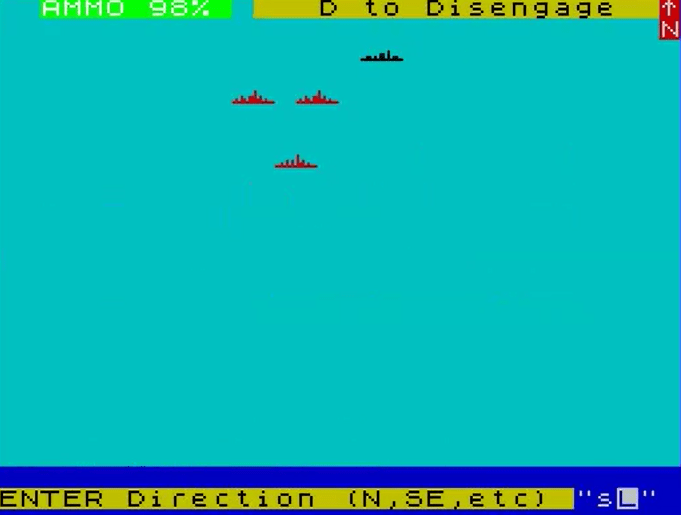
Raider 41 is the 6th game on this blog about either the Bismarck or the Graf Spee. So far, the worst “chaser” game has been better than the best “chasee” game, which is still the venerable Avalon Hill North Atlantic Convoy Raider in 1980. I also wish a game covered the less prestigious, forgotten but more efficient German auxiliary cruisers, for instance the Pinguin, which sank or captured almost 3 times more tonnage than the Graf Spee, or the Atlantis, which could camouflage into more than 20 different ships. Alas, the German Admiralty should have thought about the marketability of a name like Pinguin for future video games.
I know there have been a bunch of terrible games recently, but that’s because the good games are often longer to play. Worry not, good games will come, eventually. Even on the Spectrum.